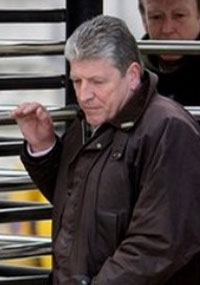25 September 2008 Edition
British Intelligence accused of 'playing Russian roulette' by Omagh relative

Stanley McCombe
BY LAURA FRIEL
A RELATIVE has said the Omagh bombing victims were “worthless in the eyes of the state”. Stanley McCombe was speaking after the latest revelations about the role of British Intelligence in the Omagh bombing and his anger was echoed by other relatives’ comments.
Godfrey Wilson contemplated the almost unthinkable that his teenage daughter, Lorraine, and the other Omagh victims might have been “sacrificed by the state”. He described his fears that there were British agents involved in the bombing, a nightmare “that there’s a Mark Haddock”.
Mark Haddock was exposed as a British agent involved in the murder of Protestant teenager Raymond McCord Jnr and numerous other murders in January 2007.
The anger and fears of the relatives of those killed and injured in the Omagh bombing flooded the media this week after the screening of a BBC television documentary.
The programme makers exposed the fact that Britain’s spying nerve-centre, GCHQ, had been monitoring the bombers’ mobile phone conversations as they drove the bomb across the border on their way to Omagh. But no action was taken to intercept the bombers.
RUSSIAN ROULETTE
Another Omagh relative accused “someone in the intelligence services” of deciding to “play Russian Roulette with our loved ones’ lives” by deciding not to intercept the bomb.
Michael Gallagher described the Omagh bombing as a “very convenient atrocity” which suited the political and ‘security’ agenda of the British Government at that time.
Stanley McCombe dismissed political reassurances given by the British and Irish governments at the time that “no stone would be left unturned” as “a pack of lies” while Michael Gallagher insisted that “these faceless people in intelligence” at the very least owed the families an explanation.
GATEKEEPERS
While Panorama was exposing the role of British Intelligence in relation to the Omagh bombing, a report into the workings of the PSNI’s Historical Enquiries Team by Dr Patricia Lundy was exposing the role of “intelligence gatekeepers”.
After two years’ unprecedented access to the HET, Dr Lundy concluded that Special Branch and other intelligence agents were acting as barriers to disclosure, denying access to information to hundreds of families seeking the truth in relation to other conflict-related, state and state-sponsored killings.
Theresa Watt, whose husband and brother were both shot dead by the British Army in 1971, told the media that after so many years she had been prepared to give anything a try in her quest for truth and justice.
The Ardoyne woman described her involvement with the HET as “grabbing at straws”.
“I thought some truth would have come out of it, but it didn’t turn out that way. I don’t know why I feel let down, I should have known better.”
Speaking in the wake of Dr Lundy’s report, Relatives for Justice spokesperson Mark Thompson called for the HET to be scrapped.
“RFJ has always maintained that the HET’s process is not independent because it is accountable to the PSNI chief constable.
“Senior officers running the HET spent several years under both Hugh Orde and John Stevens investigating collusion and the findings of that report never saw the light of day.
“We need a constructive debate in the community about finding a truth recovery process that’s completely independent and in which people can engage with confidence. The HET doesn’t meet those requirements so it needs to go. Don’t re-jig it or try to fix it, just scrap it.”
Meanwhile, relatives of the Omagh victims have called an independent cross-border public inquiry “as the only way forward”.
